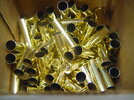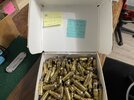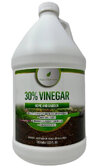You are using an out of date browser. It may not display this or other websites correctly.
You should upgrade or use an alternative browser.
You should upgrade or use an alternative browser.
Using Vinegar in Wet Tumbling
- Thread starter jski
- Start date
barnfrog
Member
Just saw a FortuneCookie45LC video about using vinegar (plus Dawn) when wet tumbling.
Is vinegar corrosive to brass? In small doses?
It's mildly acidic, so serves the same function as Lemi-Shine.
CQB45ACP
Member
Looks great.
Hooda Thunkit
Member
Nothing new about it. NRA cleaning formula back in the 1950s - long before tumblers came into regular usage - used vinegar and hot water along with some soap.
Anchorite
Member
Not really a new idea. I’ve used a miild citric solution for years to help clean stubborn brass. Admittedly it’s overkill, as (really) clean brass doesn’t make anyone more accurate a shooter or a rifle perform better. I also keep a tin of never dull on my bench and will spot rub brass and wipe before loading.
Yep, while I tend to use polish and tumble my pistol brass all super shiny, I don't even tumble my 6 Dasher cases long enough to get all of the tarnish off, then load them again, shoot great.Not really a new idea. I’ve used a miild citric solution for years to help clean stubborn brass. Admittedly it’s overkill, as (really) clean brass doesn’t make anyone more accurate a shooter or a rifle perform better. I also keep a tin of never dull on my bench and will spot rub brass and wipe before loading.


243winxb
Member
https://www.thehighroad.org/index.php?threads/cleaning-brass-using-citric-acid.708100/page-2Is vinegar corrosive to brass?
Yes.
Vinegar=dezincification=deactivate=Baking Soda.
Last edited:
jmorris
Member
- Joined
- Sep 30, 2005
- Messages
- 24,210
Yep, while I tend to use polish and tumble my pistol brass all super shiny, I don't even tumble my 6 Dasher cases long enough to get all of the tarnish off, then load them again, shoot great.
Yeah I use all sorts of methods but my smallest groups have been shot with brass that was wiped off by hand with a rag and then brushed out with a nylon brush. They don’t look as pretty but that’s not always my top priority.
JohnMc
Member
Yes. It's a time and concentration thing. Which is why we only tumble for an hour or so.Is vinegar corrosive to brass? In small doses?
Any acid, including citric, will corrode brass with enough amount of time or high enough concentration.
Organic acids (organic chemistry, not organic farming; that is, has carbon in it) like citric and acetic are usually not all that strong and won't hit metals as strongly as something like muriatic acid (HCl), formic acid being a notable exception.
The oxides are more susceptible to the acids, so with the minimal time only they get stripped off the brass.
There's an old NRA mix of water, soap, table salt and vinegar that gets brass pretty clean with 15 minutes of soaking. Don't go longer & rinse throughly! The salt by itself will corrode the brass, given enough time.
1 Pint water
1 cup white vinegar
1 tablespoon salt
1 teaspoon dish detergent
doubleh
Member
I do small batches in a plastic jar. I use lemon juice concentrate because my wife always has some in the refrigerator. Just a mall amoun in eough water to cover the brass to twice it's depth wit a couple of drops of Dawn dish washing soap, something else always at at hand also. I shake it hard at the start and 3 or 4 times during the half day I let it sit. I care nothing about the bright, shiney, new look, only clean. Then I rinse throughly using a mesh basket. It's just going to get dirty as soon as it's shot again anyway. I have never used vinegar but it should act about the same.
I use about a 1/4 cup Simple Green with about 1/2 gallon water and steel pins in a Thumbler Tumbler ! I fill the tumbler about 1/2 full of casings and water to just cover them. Tumble for 45 minutes and they come out looking brand new.
Not the only way, just the way I do it
Not the only way, just the way I do it
Me too, been a long time though. Still have all my stuffYeah I use all sorts of methods but my smallest groups have been shot with brass that was wiped off by hand with a rag and then brushed out with a nylon brush. They don’t look as pretty but that’s not always my top priority.
Anchorite
Member
Yep. Funny how as shooters, we are also specialty hoarders.Me too, been a long time though. Still have all my stuff
I think JohnMc already provided a comprehensive answer to your original question.
I have, at various times, used citric, acetic (vinegar) and/or oxalic acids to clean and shine brass. Short periods (i.e. hours, not days) of exposure to weak acids will not damage brass, but remember to thoroughly rinse and dry the brass after immersion.
I have, at various times, used citric, acetic (vinegar) and/or oxalic acids to clean and shine brass. Short periods (i.e. hours, not days) of exposure to weak acids will not damage brass, but remember to thoroughly rinse and dry the brass after immersion.
I use citric acid in the form of Lemi-Shine but may try vinegar if I ever run out. I hand tumble in an old milk jug or soda bottle for about 10 minutes, the rinse thoroughly and oven dry. My brass is squeaky clean and shiny after washing but the oven dry darkens it a little.
Yes, he's referring to the literal feel of the cases between your finger tips. It isn't just the feel of cleaned vs. uncleaned cases. Case which are dry tumbled in walnut will feel different than those in corn cob. Either will feel different than cases which have been wet tumbled...you can feel the difference as soon as you pour them out on a towel. I can't tell the difference in feel between cases which have been wet tumbled using pins and those that were wet tumbled without pins, but they do look differentOne other thing that FortuneCookie45 mentioned repeatedly was the “feel of the cases”, how “nice” they felt. Does anyone know what he’s referring to?
The Glockodile
Member
- Joined
- May 6, 2020
- Messages
- 1,688
The brass comes out really shiny using pins and detergent alone, with four hour runtimes.
Is the acid used primarily to shorten runtimes?
A do more in less time kind of thing?
Is the acid used primarily to shorten runtimes?
A do more in less time kind of thing?
westernrover
Member
- Joined
- May 4, 2018
- Messages
- 1,613
Vinegar is acetic acid. Lemi-Shine is citric acid. They accomplish the same thing by a chemical reaction with the oxides of copper and zinc. Acetic acid (vinegar) does not dissolve copper or zinc, but it will react with copper oxides and zinc oxides on the surface of the brass to create copper acetate, zinc acetate and hydrogen gas. Citric acid has a very similar reaction with copper and zinc. It forms copper citrate and zinc citrate and hydrogen gas. I've tried to be brief, but I should point out that the reactions with copper and zinc are independent. One, the other or both will react.
Therefore either acid can be used to clean the oxides away from copper, zinc or brass. So long as oxides continue to form and there is sufficient acid, the chemical reaction will continue. Since it's not practical to stop the formation of oxides over a long period of time, we wouldn't want to leave cartridges in more concentrated acid for days, weeks, or months.
I can't believe people wet tumble for as long as an hour. It just peens the case mouths. I've never needed more than 15 minutes to get results as good as any amount of time. Longer tumbling times can only make things worse.
Therefore either acid can be used to clean the oxides away from copper, zinc or brass. So long as oxides continue to form and there is sufficient acid, the chemical reaction will continue. Since it's not practical to stop the formation of oxides over a long period of time, we wouldn't want to leave cartridges in more concentrated acid for days, weeks, or months.
I can't believe people wet tumble for as long as an hour. It just peens the case mouths. I've never needed more than 15 minutes to get results as good as any amount of time. Longer tumbling times can only make things worse.
westernrover
Member
- Joined
- May 4, 2018
- Messages
- 1,613
The acids will make the brass shinier if they are used in the right concentration. Using no acid will result in clean cases but the brass will be darker. Too much acid will leave the cases gray and dull. The right amount and they will be clean and bright.
"Recipes" for brass cleaning are kind of like opinions. People will say "x tablespoons of Dawn" and "a teaspoon of Lemi-Shine" but they're probably not measuring the amount of water. They just add a random amount of brass and fill it up.
What I should do is measure the pH of my solutions. I should try mixtures with more or less acid and more or less alkaline dish soap and see what pH works best. Then I should mix my solution to the determined pH outside the tumbler, fill the tumbler with pins and brass, and then add solution that has been mixed to correct proportions last. Unless the load of brass is always the same volume, or the volume of water and soap are being measured consistently, then the amount of Lemi-Shine or vinegar is meaningless. Standby for grand-pappy's shine recipe.
"Recipes" for brass cleaning are kind of like opinions. People will say "x tablespoons of Dawn" and "a teaspoon of Lemi-Shine" but they're probably not measuring the amount of water. They just add a random amount of brass and fill it up.
What I should do is measure the pH of my solutions. I should try mixtures with more or less acid and more or less alkaline dish soap and see what pH works best. Then I should mix my solution to the determined pH outside the tumbler, fill the tumbler with pins and brass, and then add solution that has been mixed to correct proportions last. Unless the load of brass is always the same volume, or the volume of water and soap are being measured consistently, then the amount of Lemi-Shine or vinegar is meaningless. Standby for grand-pappy's shine recipe.
westernrover
Member
- Joined
- May 4, 2018
- Messages
- 1,613
I will add that I find hot water to work better than cold. That makes pre-mixed solution inconvenient because I can't just use hot tap water, but would have to heat up the solution on the stove, or mix the solution with a predetermined amount of hot tap water. Either way, I am likely to end up with too little solution or more than necessary to fill the tumbler for the amount of brass on hand. Once the unused solution cools, it would have to be heated on the stove the next time. Heating soapy water isn't particularly grievous, but for some it can intrude on the domain of another in the kitchen where anything pertaining to reloading may not be welcome. Personally, I could use an outdoor propane burner (Camp Chef) and a dedicated pot.
The main advantage of a hot solution is that it dissolves greases and oils better than a cold one, making them easier to remove. There are also benefits to a hot rinse. I find hot rinses result in much better pin separation (it becomes incredibly simple to quickly and easily get complete separation), and it is much easier to dry the brass. In my arid climate, it is all I have to do to dry the brass unless I need the brass immediately.
The main advantage of a hot solution is that it dissolves greases and oils better than a cold one, making them easier to remove. There are also benefits to a hot rinse. I find hot rinses result in much better pin separation (it becomes incredibly simple to quickly and easily get complete separation), and it is much easier to dry the brass. In my arid climate, it is all I have to do to dry the brass unless I need the brass immediately.
TRIGRTIME
Member
- Joined
- Dec 6, 2023
- Messages
- 4
Just saw a FortuneCookie45LC video about using vinegar (plus Dawn) when wet tumbling.
Is vinegar corrosive to brass? In small doses?
It does look real good!
I heard about this from my brothers friend that past away. could not remember ratio.
TRIGRTIME
Member
- Joined
- Dec 6, 2023
- Messages
- 4
WE ARE NOT HOARDERS!!!! We're Pac-Rats...Yep. Funny how as shooters, we are also specialty hoarders.
Similar threads
- Replies
- 7
- Views
- 3K
- Replies
- 13
- Views
- 1K
- Replies
- 28
- Views
- 1K
- Replies
- 91
- Views
- 21K


